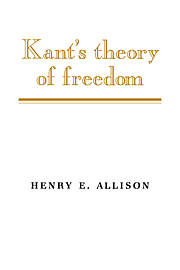Book contents
- Frontmatter
- Contents
- Acknowledgments
- Note on sources and key to abbreviations and translations
- Introduction
- Part I Freedom and rational agency in the Critique of Pure Reason
- Part II Moral agency and moral psychology
- Part III The justification of morality and freedom
- 11 The Reciprocity Thesis
- 12 The deduction in Groundwork III
- 13 The fact of reason and the deduction of freedom
- Notes
- Bibliography
- Index
11 - The Reciprocity Thesis
Published online by Cambridge University Press: 05 June 2012
- Frontmatter
- Contents
- Acknowledgments
- Note on sources and key to abbreviations and translations
- Introduction
- Part I Freedom and rational agency in the Critique of Pure Reason
- Part II Moral agency and moral psychology
- Part III The justification of morality and freedom
- 11 The Reciprocity Thesis
- 12 The deduction in Groundwork III
- 13 The fact of reason and the deduction of freedom
- Notes
- Bibliography
- Index
Summary
The second part of this study has been devoted to an analysis of the concept of freedom as it is operative in Kant's major writings in moral philosophy. Starting with a consideration of the introduction of autonomy as a property of the will in the Groundwork and the modifications in Kant's first Critique theory of agency that this involves, it has explored various aspects of Kant's views on moral agency and moral psychology as well as some of the major and persistent criticisms of these views. In so doing, however, it has bracketed the question of the grounding of morality itself, thereby following the analytic method of the first two parts of the Groundwork. Accordingly, for all that we have seen so far, the possibility remains open that as Kant himself suggests near the end of Groundwork II, morality may be a “chimerical idea,” a mere “phantom of the brain” (Gr 4: 445; 112).
The task of the third and final part of this study is to analyze and evaluate Kant's efforts to remove this specter by establishing the objective reality of the moral law and/or categorical imperative. Since Kant insists that it is only by way of practical reason and from a “practical point of view” that we are warranted in assuming the reality of freedom, success in this project is obviously crucial for his theory of freedom as well as for his moral theory.
- Type
- Chapter
- Information
- Kant's Theory of Freedom , pp. 201 - 213Publisher: Cambridge University PressPrint publication year: 1990



